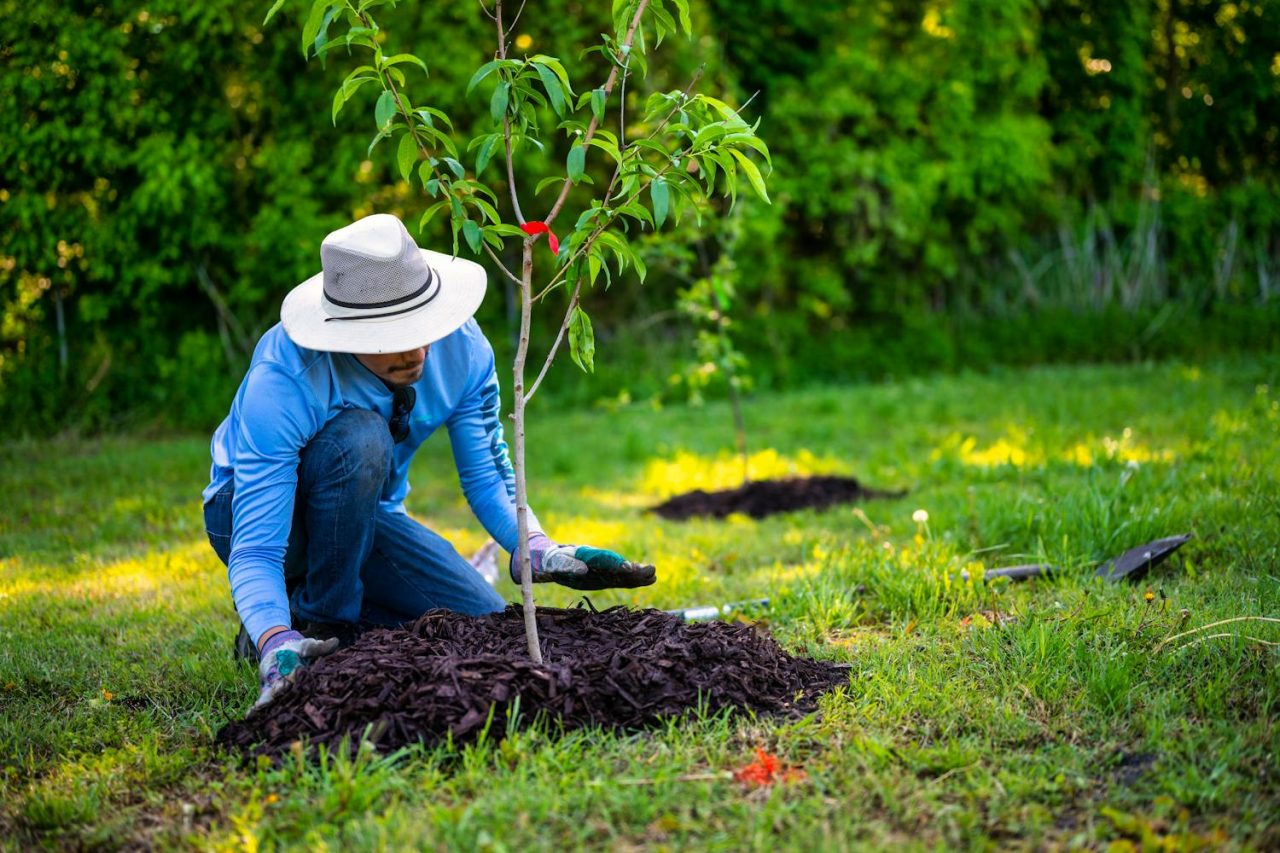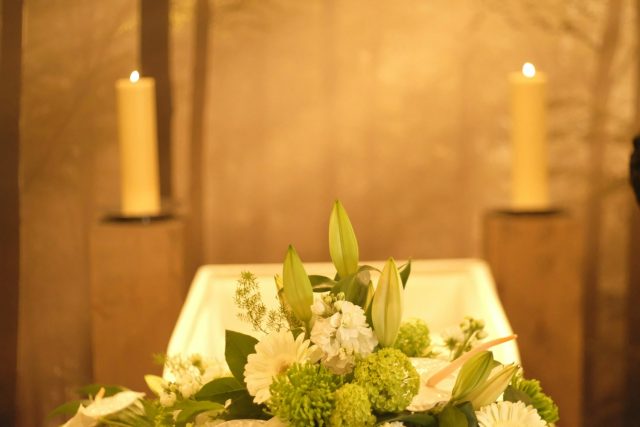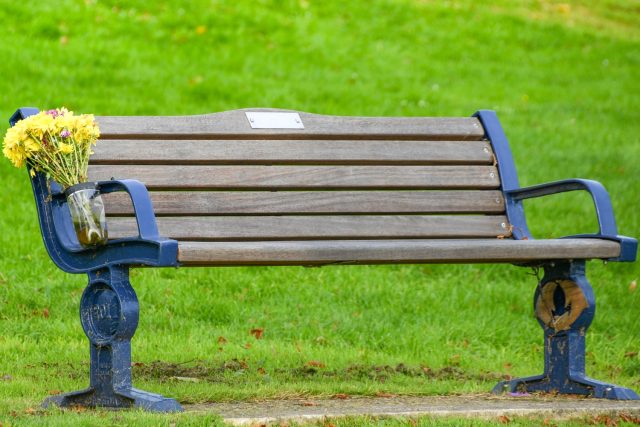
At Jamieson Funeral Directors, we understand that the loss of a loved one is a profound and deeply personal journey.
Cremation services offer a meaningful way to honour their memory, reflecting the unique life they lived. As more families choose cremation, it’s important to understand what it involves and how it can be a fitting tribute to your loved one.
Cremation has become an increasingly popular choice for many reasons, including its flexibility, cost-effectiveness and the diverse options it offers for memorialising the departed.
Whether you’re considering a traditional service with a viewing or a more private, direct cremation, this guide aims to provide you with a comprehensive understanding of the process.
In this sensitive time, our goal is to offer support and guidance, ensuring that the service you choose aligns with both your needs and the wishes of your loved one. We’ll explore the various aspects of cremation services, from the practicalities and costs to the emotional and spiritual considerations, helping you make informed decisions during this challenging time.
Why Are Funerals Important?
In the journey of grief and remembrance, funerals hold a pivotal role. They are a fundamental part of honouring a life that was lived. It’s a moment to pause, reflect and celebrate, providing closure and comfort to those left behind.
A Time for Grieving and Healing
Funerals serve as a communal space for expressing grief. They allow us to share our sorrow, find comfort in togetherness and begin the healing process. The act of coming together, sharing memories and supporting one another is a powerful step in acknowledging the loss and moving forward.
Celebrating a Unique Life
Every life is unique and so is every funeral. It’s an opportunity to celebrate the individuality of the departed – their stories, achievements and the impact they had on those around them. A funeral can be personalised to reflect the personality, beliefs and preferences of your loved one, making it a deeply meaningful event.
Find out more about making funerals unique >
Upholding Traditions and Values
For many, funerals are steeped in cultural, religious or family traditions. They are a way to honour these values and provide a sense of continuity and connection to our roots. In times of loss, these traditions can offer great comfort and a sense of belonging.
Providing Closure
Saying goodbye is an essential part of the grieving process. Funerals offer a dedicated time and place for farewells, helping family and friends to acknowledge the reality of the loss. This act of closure is crucial in moving forward and finding peace.
Strengthening Bonds
In gathering to mourn, we also gather to strengthen bonds with family and friends. Funerals remind us of the value of relationships and the support systems we have in our lives. They bring people together, often rekindling connections and offering a network of support.
Read more about why funerals are important >
Introduction to Cremations
Cremation, as an alternative to traditional burial, has been embraced by many for its simplicity and flexibility. At Jamieson Funeral Directors, we provide a respectful and dignified cremation process, ensuring that every family’s needs and wishes are honoured.
Understanding the Cremation Process
Cremation involves the reduction of the body to its basic elements through exposure to intense heat. This process is carried out with the utmost respect and care in a specially designed cremation chamber. The result is the creation of ashes, which are then returned to the family.
Reasons for Choosing Cremation
The decision to opt for cremation can be influenced by various factors.
For many, it’s a matter of personal preference or environmental considerations. Cremation is often seen as a more eco-friendly option compared to traditional burials. For others, it’s about simplicity and the desire for a less elaborate farewell. Additionally, cremation can be a more cost-effective choice, offering financial relief during a challenging time.
Flexibility in Memorialisation
One of the most significant advantages of cremation is the flexibility it offers in memorialising your loved one. The ashes can be kept in an urn, scattered in a meaningful place or even transformed into keepsake jewellery. This allows for a range of personalised and unique tributes, reflecting the individuality of the deceased.
Cremation and Rituals
Cremation does not preclude the holding of traditional funeral services. Many families choose to have a viewing or a ceremony before the cremation, providing a space for closure and togetherness.
Others opt for a memorial service after the cremation, where the urn can be present. These rituals can be tailored to fit the beliefs, values and preferences of the deceased and their family.
At Jamieson Funeral Directors, we understand the importance of choice and personalisation in the cremation process. We are here to offer guidance and support, ensuring that the final farewell to your loved one is conducted with dignity and respect, in a way that honours their memory and provides comfort to those who grieve.
How Much Does a Cremation Cost?
Understanding the cost of cremation is crucial for families planning a final farewell for their loved ones.
Cremation is often perceived as a more affordable option compared to traditional burials, but it’s important to be aware of the various factors that can influence the overall cost.
Basic Cremation Expenses
The fundamental cost of cremation includes the cremation process itself and the basic services of the funeral provider.
This typically covers the transportation of the body to the crematory, the cremation process and the return of the ashes to the family. Prices can vary significantly based on location and the specific services offered by the provider.
Additional Services and Costs
Many families choose to include additional services with a cremation, which can affect the total cost.
These services might include a viewing or visitation, a formal funeral or memorial service and rental of a casket for the service. Other costs can include the price of an urn for the ashes, any necessary permits and death certificates.
Direct Cremation: A Cost-Effective Option
For those seeking a more budget-friendly option, direct cremation is often the least expensive choice.
This process involves cremating the body without any accompanying services or ceremonies. While it is a straightforward and economical choice, families can still choose to hold a memorial service at a later date if desired.
For more information, find out whether a direct cremation or traditional cremation is the right choice for you >
Planning and Budgeting
When planning a cremation, it’s important to consider all potential costs and budget accordingly. Many funeral providers offer package deals that can simplify the process and provide clear pricing.
It’s also advisable to discuss all available options and their associated costs to make an informed decision that respects both the wishes of the deceased and the financial considerations of the family.
Want to find out more about costings? Take a closer look our funeral plans or read more about how much a cremation costs in our guide >
What to Do with Your Loved One’s Ashes After Cremation

After the cremation process, one of the most personal decisions is choosing what to do with the ashes of your loved one. This choice is deeply personal and can reflect the personality, wishes of the deceased and the needs of the family.
Keeping the Ashes
Many families choose to keep the ashes in an urn as a way to maintain a physical connection with their loved one. Urns come in various styles and materials, allowing for a personal touch. Keeping the ashes at home can offer a sense of closeness and comfort.
Scattering the Ashes
Scattering ashes in a place that was significant to the deceased is a popular choice. This could be a favourite outdoor spot, a family property or somewhere that holds special memories. It’s important to check local regulations regarding scattering ashes, as there may be restrictions in certain locations.
Burial of Ashes
Some families opt for burying the ashes in a cemetery plot, urn garden or even on private land. This provides a dedicated place where family and friends can visit and pay their respects. A memorial marker or plaque can also be placed at the site.
Creating Keepsakes
A portion of the ashes can be used to create keepsake items such as jewellery or incorporated into art, allowing family members to carry a part of their loved one with them. These keepsakes can be a comforting reminder and a way to keep the memory of the deceased close.
Sharing the Ashes
Dividing the ashes among family members is another way to remember a loved one.
This allows each person to choose a personal and meaningful way to honour the deceased, whether it’s keeping them in small urns, scattering them in different locations or using them in memorial objects.
The decision of what to do with a loved one’s ashes is a significant and personal choice. It’s an opportunity to honour the deceased in a way that is meaningful to both them and those who loved them, ensuring their memory is preserved in a manner that resonates with their life and legacy.
For more suggestions, read about what you can do with ashes after a cremation >
How to Choose a Cremation Provider
Selecting the right cremation provider is a crucial step in the process of arranging a cremation service. It involves considering various factors to ensure that the services provided align with your expectations, budget and the wishes of your loved one.
Research and Recommendations
Begin by researching local cremation providers. Online reviews, testimonials and recommendations from friends or family can be invaluable in this process.
Look for providers with a good reputation for professionalism, compassion and quality of service.
Services Offered
Different providers may offer a range of services. Some might specialise in direct cremation, while others provide more comprehensive options, including memorial services, viewings and various urn choices. Ensure that the provider you choose offers the specific services you require.
Pricing and Transparency
Understanding the cost and what is included in the price is essential. Look for providers who offer clear, upfront pricing without hidden fees. A reputable provider should be willing to provide detailed price lists and explain any additional costs.
Facility Visits
If possible, visit the cremation facility. This can give you a sense of the environment and the level of care they provide. During the visit, observe the cleanliness and organisation of the facility and how the staff interacts with clients.
Personal Interaction
The way a provider interacts with you can be a significant factor in your decision.
During your initial contact, assess their level of empathy, willingness to answer questions and their ability to provide clear and helpful information. A good provider should make you feel comfortable and supported during this difficult time.
Choosing the right cremation provider is about finding a balance between compassionate service, professionalism and affordability.
Take the time to research and ask questions to ensure that the provider you select is one that you can trust to honour your loved one in the way they deserve.
What Questions Will a Funeral Director Ask?

When arranging a cremation service, a funeral director will ask several questions to understand your needs and preferences. These questions are essential for planning a service that honours the deceased and meets the family’s expectations.
Information About the Deceased
The funeral director will need basic information about the deceased, including their full name, date of birth and date of death. This information is used for official records and the death certificate.
Type of Cremation Service Needed
You will be asked about the type of cremation service you prefer. This includes choices between direct cremation, cremation with a viewing or funeral service, or a memorial service after cremation. Your decision will guide the planning process.
Personalisation and Special Requests
Funeral directors often inquire about any special requests or personalisation you wish to include in the service. This could involve specific music, readings or any rituals that are important to you and your family.
Handling of the Ashes
You will be asked about your plans for the ashes post-cremation. Whether you plan to keep, scatter or bury the ashes, the funeral director can provide guidance and options based on your choice.
Financial Arrangements
Questions regarding budget and payment options are standard. The funeral director will discuss the costs associated with the cremation service and any additional services you may require, ensuring transparency in pricing.
Contact Information
The funeral director will need contact information for the person responsible for making decisions and handling the necessary paperwork. This is crucial for coordinating arrangements and ensuring all legal requirements are met.
These questions are designed to provide the funeral director with a clear understanding of your wishes and to ensure that the cremation service is a fitting tribute to your loved one.
Learn more about the questions a funeral director will ask you >
A Respectful Goodbye
Cremation services offer a meaningful and personal way to say farewell to a loved one. Understanding the various aspects of cremation – from the costs to the different service options – can help in making informed decisions during a challenging time.
Ultimately, the way we choose to say goodbye is deeply personal. Cremation services offer the flexibility to create a farewell that is as unique as the life it commemorates. In these moments of reflection and remembrance, we find comfort, closure and a lasting tribute to those we have lost.
Planning a Cremation Service? We’re Here to Help
Deciding on a cremation service can be a deeply personal and sometimes overwhelming process.
Whether you’re considering a direct cremation, a traditional service or something unique, we’re here to provide guidance and support every step of the way. Our experienced team is committed to honouring your loved one’s memory with compassion and dignity.
If you have questions or need assistance in planning a cremation service, please don’t hesitate to reach out. We offer a range of options to suit your needs and preferences, ensuring a respectful and fitting tribute to your loved one.
Contact us today on 01179-564-796 or directors@jamiesonfunerals.co.uk to discuss how we can help you during this difficult time.
Related FAQs
- 7 Touching Memorial Poems for Grandad’s FuneralSaying goodbye to a beloved grandad is never easy. Whether he was a gentle storyteller, a steady hand through life’s ups and downs or the heart of the family, the… Read more: 7 Touching Memorial Poems for Grandad’s Funeral
- Can You Attend a Direct Cremation?Direct cremation has grown in popularity in recent years, especially for those looking for a simpler, more cost-effective alternative to a traditional funeral. With no formal service, no procession and… Read more: Can You Attend a Direct Cremation?
- 25 Memorial Plaque Ideas to Honour a Loved OneChoosing a memorial plaque is a tender and significant part of remembering someone you love. Whether it’s placed beside a grave, in a peaceful garden or on a favourite bench,… Read more: 25 Memorial Plaque Ideas to Honour a Loved One




